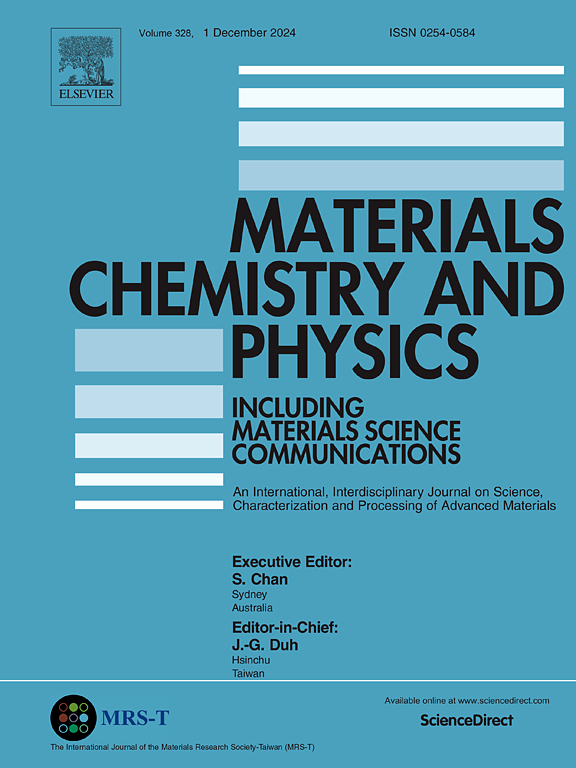Utilization of high-magnesium ferronickel slag activated by wet grinding in MKPC under humid conditions
IF 4.3
3区 材料科学
Q2 MATERIALS SCIENCE, MULTIDISCIPLINARY
引用次数: 0
Abstract
Magnesium phosphate cement (MPC) is competitive in engineering repair and reinforcement. Enhancing the activity of furnace ferronickel slag (EFS), as a substitution of MgO, is of great significance for mitigating the high carbon emissions and high cost of MPC. In present study, the technology of wet grinding was provided to tackle the issues of sluggish dissolution and limited activity of EFS. The properties of EFS-MKPC composites were systematically analyzed cured in humid condition, including three different fineness levels of EFS (D50 : 14.5 μm, 10.5 μm, 6.12 μm) and three varying contents of EFS (15 %, 30 %, 45 %). Heat of hydration, X-ray diffractometer (XRD), thermogravimetric analysis (TG), mercury intrusion porosimetry (MIP) and scanning electron microscopy (SEM) were used to explore the hydration reaction and microstructures changes. The results showed that wet grinding enhances the dissolution of magnesium and substantially improves the initial hydration activity of EFS. The 1 d compressive strength of EFS-MPC with 30 % and 45 % EFS reaches 119 % and 100 % of that of the control. The results of XRD and TG also proved that the hydration reaction of EFS is promoted and the effect is more significant with the extension of grinding duration. Meanwhile, the microstructures of EFS-MPC were optimized by incorporating fine EFS under humid conditions, which may be related to the activated silica from EFS. The findings suggested that wet grinding is an effective method that could enhance phase separation of EFS, which is a viable alternative for improving the utilization of EFS and water resistant of MPC.
在潮湿条件下利用 MKPC 中通过湿法研磨活化的高镁镍铁渣
磷酸镁水泥(MPC)在工程修复和加固中具有很强的竞争力。提高炉内镍铁渣(EFS)的活性,作为MgO的替代品,对降低MPC的高碳排放和高成本具有重要意义。本研究提出了湿法研磨技术,以解决EFS溶解缓慢和活性有限的问题。系统分析了EFS- mkpc复合材料在湿固化条件下的性能,包括3种不同的EFS细度(D50分别为14.5 μm、10.5 μm、6.12 μm)和3种不同的EFS含量(15%、30%、45%)。采用水化热、x射线衍射(XRD)、热重分析(TG)、压汞孔隙分析(MIP)和扫描电镜(SEM)等方法对水化反应及微观结构变化进行了研究。结果表明:湿磨促进了镁的溶解,显著提高了EFS的初始水化活性;30%和45% EFS- mpc的1 d抗压强度分别达到对照的119%和100%。XRD和TG的结果也证明,随着磨矿时间的延长,EFS的水化反应得到了促进,且效果更为显著。同时,在湿润条件下,加入细粒EFS优化了EFS- mpc的微观结构,这可能与EFS中的活性二氧化硅有关。研究结果表明,湿磨是一种有效的增强EFS相分离的方法,是提高EFS利用率和MPC耐水性的可行选择。
本文章由计算机程序翻译,如有差异,请以英文原文为准。
求助全文
约1分钟内获得全文
求助全文
来源期刊

Materials Chemistry and Physics
工程技术-材料科学:综合
CiteScore
8.70
自引率
4.30%
发文量
1515
审稿时长
69 days
期刊介绍:
Materials Chemistry and Physics is devoted to short communications, full-length research papers and feature articles on interrelationships among structure, properties, processing and performance of materials. The Editors welcome manuscripts on thin films, surface and interface science, materials degradation and reliability, metallurgy, semiconductors and optoelectronic materials, fine ceramics, magnetics, superconductors, specialty polymers, nano-materials and composite materials.
 求助内容:
求助内容: 应助结果提醒方式:
应助结果提醒方式:


